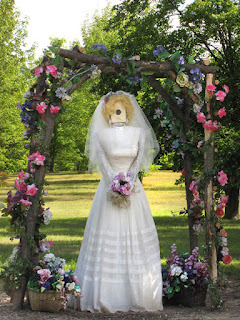
After the success of my painting the other day, I was itching to try again but I was out of blank canvas. So I thought I'd (okay, I know this sounds crazy) gesso a cigar box I'd picked up at the thrift store and then try painting the box.
As you can see, the experiment was NOT all that successful -- at least, not as a work of art. Plus it was not helped by the fact that I was using leftover paint scraps from the previous work, by the indentations on the box, or by the texture of the brush strokes in the gesso.
But I did notice that as it began to take shape, even though I knew it wasn't done, I was increasingly reluctant to add any new paint for fear of wrecking what I'd already done. I've noticed this phenomenon before, but in this case it was almost tangible, as if with every stroke a wall of resistance was being built, making each subsequent stroke that much more difficult to execute.
At last I couldn't plow through any further -- a couple of the experiments I'd tried in my attempts to break through had failed pretty miserably, and I didn't have the strength or courage to go further -- but I thought perhaps some strokes of a pen might help, so I left the pen beside the box and went away.
But I do all my work on the dining room table, so there it was, waiting for me, as I sat down for my morning coffee. Sigh.
I'd been experiencing a surfeit of Tao lately -- even if it is translated by Thomas Merton, I found I was craving something a bit more Abrahamic -- so I'd broken out my two favorite day-by-day books,
A Year with Hafiz and
A Year with Rumi, to see if I could find something that resonated a bit more with my Abrahamic soul. The gifts came from Hafiz, first in the poem for today, "More Inheritance:"
"
Bring yourself, again,
into the presence of someone who knows God,
for more inheritance is there for you.
Hold hands with the Buddha,
if a living saint's warmth has been forgotten."
Yep, I thought -- that's what I've been missing -- the presence, the language of someone who knows the God I grew up with. Even Buddha feels closer to my original faith than the sort of ephemeral detachment of the Tao. Not that I can't love it, and learn from it, but... I need more.
And then, from tomorrow's poem, "A Woman He Held," in which he describes a man, rowing a boat containing the woman he loves,
"
as the wing of a duck,
landing on the other side of the pond,
gently touches her cheek.
... All of God, which is everything, is really so close,
and caresses us now and then
if your senses are alert.
The falcon's wing, on my better days,
crafts these images as I watch."
First the hand of the Buddha, and then the caress of God -- little wonder, then, that when I looked at the top of the box again, I saw a hand's caress. I didn't think much about it, but began to draw. And then I looked at the poems again and realized how they had influenced my vision.
It's still not a great image. It's still not a beautiful box. But I think I'll leave it, and keep my paints in it -- I've been looking for a better way to organize those tubes. It will serve to remind me why it is that I paint at all; why I do ANY art, for that matter: it's to feel again the caress of the holy, which is everything, which is close, which, on my better days, crafts these images as I watch.
Perhaps next time I should meditate before I paint...
 I don't generally like to shoot in the middle of the day, as the cameras I use have a pretty limited dynamic range. But every once in a while I make an exception. On this particular day, the sky was so clear and the colors so rich I just couldn't resist bringing along the camera. It was a bit of a calculated risk -- and also an adventure: we were going someplace we'd never been before, although not that far from home. And, as you can see here, my camera did a surprisingly good job of stepping up to the demands of the mid-day light.
I don't generally like to shoot in the middle of the day, as the cameras I use have a pretty limited dynamic range. But every once in a while I make an exception. On this particular day, the sky was so clear and the colors so rich I just couldn't resist bringing along the camera. It was a bit of a calculated risk -- and also an adventure: we were going someplace we'd never been before, although not that far from home. And, as you can see here, my camera did a surprisingly good job of stepping up to the demands of the mid-day light.





























